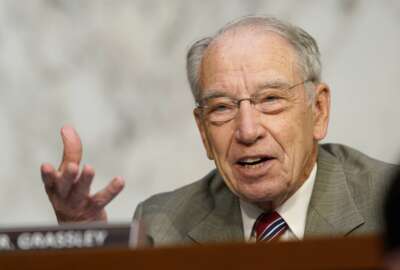The Federal Headlines is a daily compilation of the stories you hear discussed on the Federal Drive.
- Sen. John McCain (R-Ariz.) wants more answers from the Merit Systems Protection Board about its decision to overturn punishments for two senior executives at the Veterans Affairs Department. McCain wrote to MSPB Chairman Susan Tsui Grundmann, asking for an analysis of the principles, laws and regulations that MSPB judges use during their decision making process in these VA appeals cases. Grundmann has until March 11 to respond. Sen. Ron Johnson (R-Wis.), Jeff Flake (R-Ariz.) and Jerry Moran (R-Kan.) also signed the letter. (Sen. John McCain)
- The Centers for Medicare & Medicaid Services approve expanding Medicaid coverage for several thousand residents of Flint, Michigan affected by the lead contamination crisis there. Approximately 15,000 additional children and pregnant women will be eligible for Medicaid coverage and 30,000 current Medicaid beneficiaries will be eligible for expanded services under the new waiver agreement. (HHS)
- The Homeland Security Department looks to step up efficiency for its employment-based-visa process. It’s launching a Known Employer pilot program where pre-selected employers looking to bring in foreign workers will be screened up front. The agency said it will reduce costs, delays, and paperwork in the process Citizenship and Immigration Services uses to review an employer’s eligibility to sponsor individuals. (DHS)
- Defense Secretary Ash Carter continues his West Coast outreach to the nation’s major technology firms. Speaking at the RSA conference in San Francisco, the secretary asked members of the technology sector to reach out to DoD more often to connect with it and help solve problems. He cited partnerships between the Pentagon and Silicon Valley already established like the Defense Innovation Advisory Board announced earlier this week. (DoD)
- The Justice Department charges 14 more individuals in connection with the 2014 armed standoff against the Bureau of Land Management in Nevada. They face several charges, including conspiracy to commit an offense against the United States and conspiracy to impede or injure a federal officer. Included in the group are two sons of ranch owner Cliven Bundy, who sparked the incident when he declined to renew his permit for cattle grazing on BLM-administered lands. (Justice Department)
- Cloud computing can help agencies solve technology challenges for people with disabilities if it’s used correctly. NIST released a new draft publication trying to help agencies do just that. The document explores the difficulties that employees with disabilities may face as agencies migrate to the cloud. The draft publication highlights NIST’s analysis of popular cloud apps such as email or calendars, to identify accessibility barriers and how to prevent them. NIST also developed a cloud computing accessibility vocabulary so there is a common language to discuss problems and solutions, and to use during procurement of cloud services. (NIST)
- The Department of Health and Human Services claims an ahead-of-schedule victory in Medicare payment reform. 30 percent of Medicare payments now go through a new model established under the Affordable Care Act. That milestone has been reached a year ahead of schedule, said Patrick Conway, chief medical officer of the Centers of Medicare and Medicaid Services. Under the alternative payment model, providers receive reimbursement based on medical outcomes rather than number of patient visits. Conway said the new model saves hundreds of millions of dollars a year.
- Industry seems resistant and confused over the Defense Department’s proposed rule to get more information from companies before providing them with public research funds. The proposed rule requires companies to detail the nature and value of research projects before receiving government funds. During a town hall meeting on the rule, industry seemed resistant to change and said regulations would stifle innovation. Industry also seemed confused about the definition of the problem. DoD said companies are focusing too much on short-term competitive contracts and not enough on long-term innovation with the public funds the companies receive. (Federal News Radio)
Copyright
© 2024 Federal News Network. All rights reserved. This website is not intended for users located within the European Economic Area.




